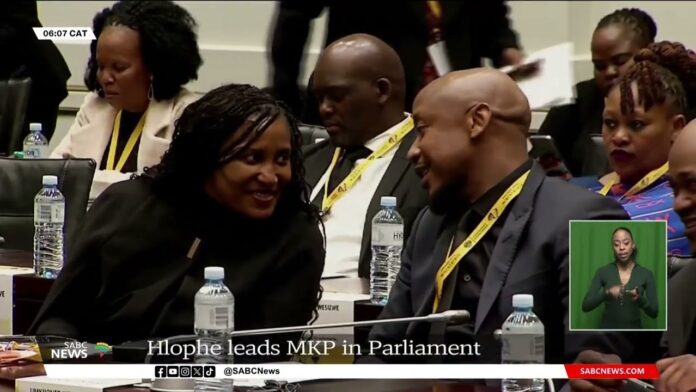Former President Jacob Zuma’s daughter, Duduzile Zuma, enters parliament alongside other Umkhonto Wesizwe (MK) party members
Duduzile Zuma, known for her unwavering support of her father during his presidency and subsequent legal battles, has now taken her place as a Member of Parliament (MP) for the MK Party. Alongside her are notable figures like John Hlophe, the impeached former Judge President of the Western Cape, who now assumes the role of the MK Party’s chief whip. This move follows the MK Party’s successful bid in the recent general elections, securing 58 seats in the National Assembly and overtaking the Economic Freedom Fighters (EFF) to become South Africa’s third-largest political party.
The swearing-in ceremony, originally scheduled for last week, was delayed due to the MK Party’s protest against alleged vote rigging involving the Independent Electoral Commission (IEC). Despite the delay, Hlophe and other MK members are now positioned as a formidable force within Parliament, asserting their mandate to represent their supporters vigorously.
Hlophe, addressing the media following his inauguration, emphasized the party’s commitment to constructive parliamentary engagement while asserting their independence from external pressures. “We have been elected by the people of this country. We are here to work and engage in robust debates, maintaining respect but refusing to be intimidated,” Hlophe declared. This stance underscores the MK Party’s determination to operate autonomously within South Africa’s political sphere.
Duduzile Zuma’s entry into Parliament signifies not only her personal political debut but also her continued alignment with her father’s political legacy and the causes championed by the MK Party. Her presence is expected to add a vocal and influential dimension to the party’s parliamentary activities, particularly in advocating for issues close to the party’s platform.
The MK Party’s rise to prominence, despite challenges and controversies surrounding its members, reflects a growing diversification in South Africa’s political landscape. With a focus on representing disenfranchised voices and challenging established political norms, the party’s role as the new opposition underscores shifting voter sentiments and aspirations for change within the electorate.
As Parliament convenes with its newly constituted members, including those from the MK Party, South Africa anticipates heightened debates and legislative activities that could redefine the nation’s political discourse and policy direction.
Analysis:
Political Perspective: The emergence of the MK Party as South Africa’s third-largest political entity signals a significant shift in the country’s political dynamics. Led by figures like John Hlophe, known for his contentious judicial history, the party’s parliamentary presence challenges traditional political alignments. Their stance against perceived electoral irregularities and commitment to assertive parliamentary conduct positions them as a potential disruptor within the National Assembly, influencing legislative agendas and debates.
Social Perspective: Duduzile Zuma’s parliamentary entry symbolizes continuity in familial political allegiance, resonating with supporters who identify with her father’s legacy. Her advocacy within the MK Party may amplify voices traditionally marginalized in mainstream politics, addressing social justice issues and advocating for policies benefiting marginalized communities. The MK Party’s rise reflects broader societal aspirations for inclusive representation and responsive governance.
Economic Perspective: While specific economic policies of the MK Party remain to be articulated, their electoral success underscores voter dissatisfaction with prevailing economic conditions and policies. As a newly minted opposition force, the party’s role in shaping economic debates—from job creation to equitable growth—will be pivotal. Their presence could foster competition among political parties to address socio-economic inequalities and stimulate economic reform agendas.
Racial Perspective: The MK Party’s composition and leadership, including figures like Duduzile Zuma and John Hlophe, reflect South Africa’s complex racial and historical dynamics. Their political ascent raises questions about racial representation, historical justice, and the intersection of race with governance. The party’s platform and policies will likely be scrutinized through a racial equity lens, particularly in addressing historical injustices and advancing policies that promote inclusive development.
Gender Perspective: Duduzile Zuma’s role as an MP within the MK Party highlights gender dynamics within South African politics. Her presence in Parliament, alongside other female leaders within the party, underscores efforts to achieve gender parity and advocate for women’s rights within legislative frameworks. The party’s approach to gender issues, including policies on women’s empowerment and representation, will be critical in shaping their broader political agenda and appeal to diverse voter demographics.
